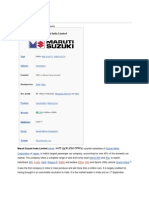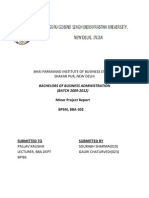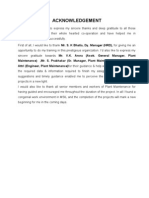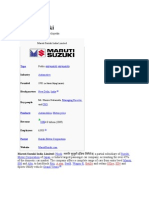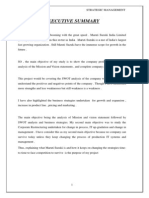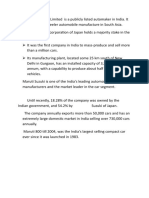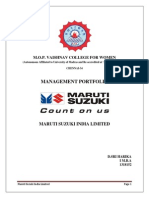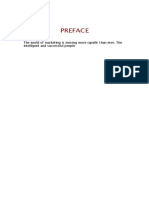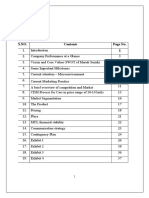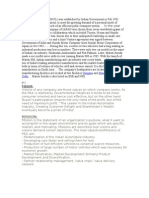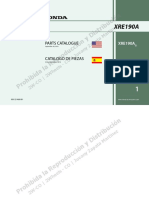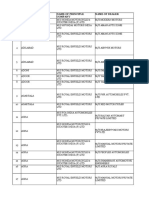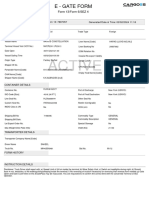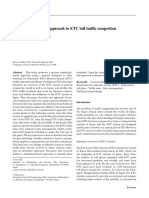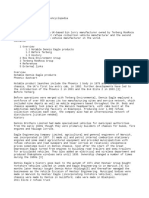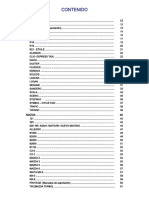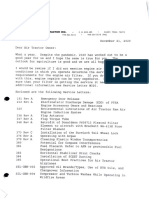INTRODUCTION TO COMPANY
Maruti Suzuki India Limited (NSE: MARUTI, BSE: 532500) a partial subsidiary of Suzuki Motor Corporation of Japan, is India's largest passenger car company, accounting for over 45% of the domestic car market. The company offers a complete range of cars from entry level Maruti 800 and Alto, to hatchback Ritz, A star, Swift, Wagon-R, Estillo and sedans DZire, SX4, in the 'C' segment Maruti Eeco and Sports Utility vehicle Grand Vitara.
�It was the first company in India to mass-produce and sell more than a million cars. It is largely credited for having brought in an automobile revolution to India. It is the market leader in India and on 17 September 2007, Maruti Udyog Limited was renamed Maruti Suzuki India Limited. The company's headquarters are located in New Delhi.
Maruti Udyog Limited:
1) Companys Portfolio: Maruti Udyog Limited (MUL),INDIAs finest and Asias largest automobile industry was established in 1981 by an act of parliament.MUL, the first automobile company in the world to be honored with an ISO 9000:2000 certificate, is a subsidiary of Suzuki Motor Corp (holds a 54% equity stake). The Government of India remains a significant equity stakeholder (10%).With its early mover advantage in Indian market; Maruti retains a dominant Market share despite increasing competition. 2) Business Portfolio: The Group's principal activity is to manufacture, purchase and sale of Motor Vehicles and Spare parts. The other activities of the Group comprises of facilitation of PreOwned Car Sales, Fleet Management and Car Financing.
�The Group also provides services like framing of customized car policies, economical leasing of cars, maintenance management, registration and insurance management, emergency assistance and accident management. The product range includes ten basic models with more than 50 variants. The Group has operations in over 100 cities with more than 150 outlets and also exports cars to other countries.
Vision:
Visions of any company are those values on which company works. As the MUL is started by Governmental initiatives it tends to be more consumer oriented and hence cost effective, but on the other hand Suzukis participation ensures not only need of the profit, but of the need of maximum profit. The only way for this Noras dilemma of selecting principals for companys working vision, was to maximize profit and reducing cost by maximizing output and sales Hence MUL declared its Vision asThe Leader in the Indian Automobile Industry, Creating Customer Delight1 and Shareholder's Wealth2; eventually become a pride of India Customer Delight1 is making sure that performance, after sales service and customer support are best and beyond expectation.
�Shareholders wealth2 is the prime concern for running business smoothly.MUL knows this and understands customer is king, he can change the fortune of any company, hence goes
companys Brand line: COUNT ON US!
Mission:
Mission is the statement of an organizations purpose, what it want to accomplish in the larger environment and its goals which are specific, realistic and motivating. Missions are described over visions and visions demand certain objectives. The main objectives/Missions of MUL are: - Modernization of the Indian Automobile Industry. - Developing cars faster and selling them for less. - Production of fuel-efficient vehicles to conserve scarce resources. - Production of large number of motor vehicles which was necessary for economic growth. - Market Penetration, Market Development Similarly Product
�Development and Diversification. - Partner relationship management, Value chain, Value delivery network.
Type Traded as Industry Founded
Public BSE: 532500 NSE: MARUTI Automotive 1981 (as Maruti Udyog Limited)
Headquarters New Delhi, India [1] Key people Products Revenue Net income Employees Mr. Shinzo Nakanishi, Managing Director and CEO Automobiles 37,522.4 crore (US$8.37 billion) (2010-2011) [2] 2,288.6 crore (US$510.36 million) (2010-2011) [3] 6,903 [4]
�Parent
Suzuki Motor Corporation Website: MarutiSuzuki.com
�ADDRESS MARUTI SUZUKI INDIA LIMITED. NELSON MANDELA ROAD,VASANT -KUNJ NEW DELHI-110070 . BOARD NO.46781000 FAX NO-46150275 and 46150276
Market share
�Company Overview:
Maruti Suzuki India has four plants, three located in Palam Gurgaon Road, Gurgaon, Haryana and one located at Manesar Industrial Town, Gurgaon, Haryana. During the fiscal year ended March 31, 2009, the Company produced and sold over seven million cars, and exported more than 500,000 cars. The Company's subsidiaries include Maruti Insurance Business Agency Limited, Maruti Insurance Distribution Services Limited, Maruti Insurance Agency Solutions Limited, Maruti Insurance Agency Network Limited, Maruti Insurance Agency Services Limited and Maruti Insurance Agency Logistics Limited. The Companys subsidiaries are engaged in the business of selling motor insurance policies to owners of Maruti Suzuki vehicles With 500,000 units exported, exports constitute around 7% of Maruti Suzukis annual sales. The export volume for the company grew by over 32% in FY2008-09The company through a joint venture with Suzuki Power train India has begun to manufacture diesel engines, petrol engines and transmission assemblies for four-wheelers with an investment of Rs 175 crore. It is planned to scale up the capacity to 300,000 engines/annum by 2010. Business and Financial Metrics From FY2004 to FY 2009, sales revenues have grown from Rs 9,081 crore to Rs 20,358 crore, at average annual rate of over 20%.In the same period, net profit grew from Rs 542 crore to Rs 1,218 crore by over 20% average annual growth rate.. Despite
�the general economic slowdown, the sales of Maruti Suzuki increased from Rs 17,860 Crore to Rs 20358 Crore. This was mainly due to the strong presence of the company in the small car segment, which was not affected by the downturn. But due to the increase in the material cost on account of increased commodity prices and adverse foreign exchange fluctuations, the EBITDA fell from 17.5% to 12% and net profit margin fell from 9.7% to 8.2%. The company plans to continue with its Rs. 9,000 Crore expansion plan which is to be completed by Dec 2010. Under the same expansion plans the company increased the capacity of its Manesar plant by 70% in January 2009. Shareholding Details Suzuki Motor (SZKMF) owns 38.61% of Maruti Suzuki India. Financial institutions and insurance companies own another 20.73% and 15.83% of the company, respectively. Reliance Vision Fund, Reliance Growth Fund, Reliance Equity Fund are the mutual funds invested in the firm, with 0.31%, 0.30% and 0.28% ownership respectively.
WE offer
Services offered
Current sales of automobiles
�Red Bull Maruti Suzuki Swift
Maruti Omni
India's Corps of Military Police personnel patrolling the Wagah border crossing in the Punjab in a Maruti Gypsy.
Maruti Alto
�Maruti Suzuki Swift
Maruti Suzuki Zen Estilo
Suzuki SX4
7th Generation Suzuki Alto is sold as Maruti Suzuki A-Star in India.
�Maruti Suzuki Swift DZire
Suzuki Splash is sold as Maruti Suzuki Ritz in India.
Manufactured locally
800 (Launched 1983) Omni (Launched 1984) Gypsy (launched 1985) Wagon R (Launched 1999) Alto (Launched 2000) Swift (Launched 2005) Estillo (Launched 2009) SX4 (Launched 2007) Swift DZire (Launched 2008) A-star (Launched 2008) Ritz (Launched 2009) Eeco (Launched 2010) Alto K10 (Launched 2010)
Imported
�Suzuki Grand Vitara Grand Vitara (Launched 2007) Kizashi (Launched 2011)
Discontinued car models
1000 (19901994) Zen (19932006) Esteem (19942008) Baleno (19992007) Zen Estillo (20062009) Versa (20012010) Grand Vitara XL7 (20032007)
Partner for the joint venture Sanjay Gandhi owned the Maruti Technical Services Limited, which ran into trouble and was liquidated. After the death of Sanjay Gandhi, the Indira Gandhi government assigned a delegation of Indian technocrats to hunt for a collaborator for the project. Initial rounds of discussion were held with the giants of the automobile industry in Japan including Toyota, Nissan and Honda. Suzuki Motor Corporation was at that time a small player in the four wheeler automobile sector and had major share in the two wheeler segment. Suzuki's bid was considered negligible. While the major companies were personally represented in the initial rounds of discussion, Osamu Suzuki, Chairman and CEO of the company ensured that he was present in all the rounds of discussion. Osamu in an article writes that it subtly massaged their (Indian delegation's) egos and also convinced them about the sincerity of Suzuki's bid. Suzuki in return received a lot of help from the government in such matters as import clearances for manufacturing equipment (against the wishes of the Indian
�machine tool industry then and its own socialistic ideology), land purchase at government prices for setting up the factory Gurgaon and reduced or removal of excise tariffs. This ensured that Suzuki conscientiously nursed Maruti Suzuki through its infancy to become one of its flagship ventures.


